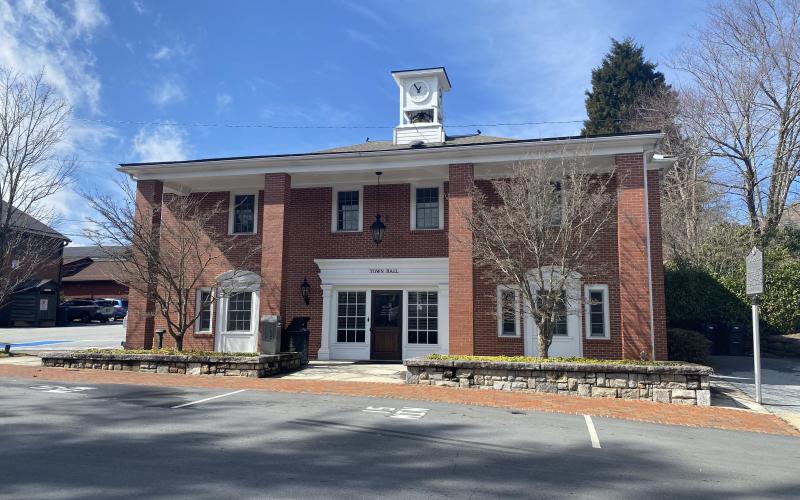Save Highlands attorney Derek Allen sent a letter to the Town of Highlands attorneys Jay Coward and Craig Justice attempting prelitigation to resolve what the group claims as a procedural issue after the town made the decision to adopt amendments to the Uniformed Development Ordinance.
In the letter, Allen states that the Town of Highlands failed to provide adequate notice of the ordinance changes per N.C. Gen. Stat. § 160D-601(a).
That statue says, “Before adopting, amending or repealing any ordinance or development regulation authorized by this Chapter, the governing board shall hold a legislative hearing. A notice of the hearing shall be given once a week for two successive calendar weeks in a newspaper having general circulation in the area. The notice shall be published the first time not less than 10 days nor more than 25 days before the date scheduled for the hearing. In computing such period, the day of publication is not to be included but the day of the hearing shall be included.”
The letter goes on to state several N.C. General Statutes, as well as court cases that mention giving a “legislative hearing,” “notice of public hearing,” and cases that deal with ordinances enacted without proper notice. For example, the letter lists Sellers v. Asheville, invalidating the City of Asheville zoning ordinances for failure to comply with publication requirement, Bd. of Adjustment v. Town of Swansboro, the case of Molamphy v. Town of S. Pines and Vulcan Materials Co. v. Iredell City.
As for the UDO amendments themselves, Allen said in the letter that the Town Board of Commissioners hired new legal counsel, had them draft a new ordinance and only publicly revealed the new ordinance the evening of May 16, 2022, “mere days before the hearing.”
“Last year, the Town complied with N.C. Gen. Stat. § 160D-604(b) and Section 4.3.1 by submitting to the Planning Board its proposed draft amendments of the UDO,” Allen said. “The Planning Board did its part, considered the proposed ordinance taking into account public comment and submitted a revised ordinance to the Town on Feb. 1, 2022. The Town, however, scrapped its originally proposed ordinance and the revised version the Planning Board recommended. Instead, the Town hired new legal counsel, had them draft a completely new ordinance, and only publicly revealed the new ordinance the evening of May 16, 2022, mere days before the hearing.”
Allen said on the evening of May 19, the town approved more restrictive ordinance amendments to the UDO.
“The Town on the fly made the newly proposed ordinance substantially more restrictive by prohibiting - for the first time - vacation rentals in the R-2 district,” Allen said. “No previous draft ordinance contained this restriction. Property owners in R-2 had no notice that the Town planned to restrict their property. Because of these issues, the Town must resubmit the draft ordinance to the Planning Board per N.C. Gen. Stat. § 160D-604(b) and Section 4.3.2 before it can be validly adopted.”
There are some other issues that the Town passed in the new amendments, according to Allen.
“For example, the zoning permit scheme is a flat out-registration unambiguously contrary to the Vacation Rental Act and the Court of Appeals’ recent holding in Schroeder,” Allen said. “Likewise, and contrary to the mayor’s assertion otherwise, the new ordinance does not protect the vested rights of those who rented their property to visitors of Highlands. The whole ordinance is legally problematic unlike the ordinance recommended by the Planning Board, which came close to legal compliance. In short, the Town must follow the procedure mandated by the General Assembly and its own UDO before passing an amended zoning ordinance. It did not do so here. The Town therefore must rescind the new ordinance, refer the newly proposed ordinance to the Planning Board and then follow the proper procedures for enactment. Until the Town does that, any actions in furtherance of the ordinance are illegal and should be ignored by owners and operators of vacation rentals.
All our clients want from the Town is for it to follow the law and allow their input into restrictions on their property. That is not too much to ask; the Planning Board did these two basic things. Yet, the Town inexplicably continues to refuse to even follow the law.”
As of press time, Coward did not respond for a statement about the letter, but a special called board of commissioners meeting was scheduled for Friday, June 10, at 3 p.m. to meet in a closed session with their attorneys.
- By Christopher Lugo

